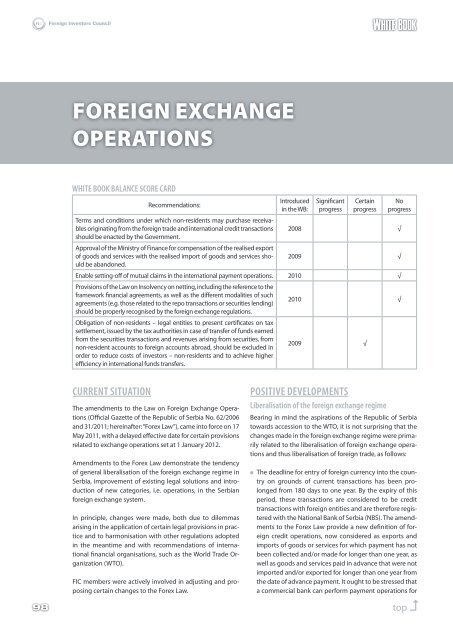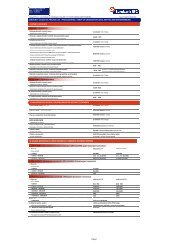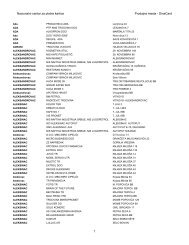Fic rEcommEndationS - Eurobank EFG
Fic rEcommEndationS - Eurobank EFG
Fic rEcommEndationS - Eurobank EFG
Create successful ePaper yourself
Turn your PDF publications into a flip-book with our unique Google optimized e-Paper software.
FOREIGN EXCHANGE<br />
OPERATIONS<br />
WHitE BooK BaLancE ScorE card<br />
Recommendations:<br />
Introduced<br />
in the WB:<br />
Significant<br />
progress<br />
Certain<br />
progress<br />
No<br />
progress<br />
Terms and conditions under which non-residents may purchase receivables<br />
originating from the foreign trade and international credit transactions<br />
should be enacted by the Government.<br />
Approval of the Ministry of Finance for compensation of the realised export<br />
2008 √<br />
of goods and services with the realised import of goods and services should<br />
be abandoned.<br />
2009 √<br />
Enable setting-off of mutual claims in the international payment operations.<br />
Provisions of the Law on Insolvency on netting, including the reference to the<br />
2010 √<br />
framework financial agreements, as well as the different modalities of such<br />
agreements (e.g. those related to the repo transactions or securities lending)<br />
should be properly recognised by the foreign exchange regulations.<br />
Obligation of non-residents – legal entities to present certificates on tax<br />
settlement, issued by the tax authorities in case of transfer of funds earned<br />
2010 √<br />
from the securities transactions and revenues arising from securities, from<br />
non-resident accounts to foreign accounts abroad, should be excluded in<br />
order to reduce costs of investors – non-residents and to achieve higher<br />
efficiency in international funds transfers.<br />
2009 √<br />
cUrrEnt SitUation<br />
The amendments to the Law on Foreign Exchange Operations<br />
(Official Gazette of the Republic of Serbia No. 62/2006<br />
and 31/2011; hereinafter: “Forex Law”), came into force on 17<br />
May 2011, with a delayed effective date for certain provisions<br />
related to exchange operations set at 1 January 2012.<br />
Amendments to the Forex Law demonstrate the tendency<br />
of general liberalisation of the foreign exchange regime in<br />
Serbia, improvement of existing legal solutions and introduction<br />
of new categories, i.e. operations, in the Serbian<br />
foreign exchange system.<br />
In principle, changes were made, both due to dilemmas<br />
arising in the application of certain legal provisions in practice<br />
and to harmonisation with other regulations adopted<br />
in the meantime and with recommendations of international<br />
financial organisations, such as the World Trade Organization<br />
(WTO).<br />
FIC members were actively involved in adjusting and proposing<br />
certain changes to the Forex Law.<br />
PoSitiVE dEVELoPmEntS<br />
Liberalisation of the foreign exchange regime<br />
Bearing in mind the aspirations of the Republic of Serbia<br />
towards accession to the WTO, it is not surprising that the<br />
changes made in the foreign exchange regime were primarily<br />
related to the liberalisation of foreign exchange operations<br />
and thus liberalisation of foreign trade, as follows:<br />
The deadline for entry of foreign currency into the country<br />
on grounds of current transactions has been prolonged<br />
from 180 days to one year. By the expiry of this<br />
period, these transactions are considered to be credit<br />
transactions with foreign entities and are therefore registered<br />
with the National Bank of Serbia (NBS). The amendments<br />
to the Forex Law provide a new definition of foreign<br />
credit operations, now considered as exports and<br />
imports of goods or services for which payment has not<br />
been collected and/or made for longer than one year, as<br />
well as goods and services paid in advance that were not<br />
imported and/or exported for longer than one year from<br />
the date of advance payment. It ought to be stressed that<br />
a commercial bank can perform payment operations for<br />
98 top �




